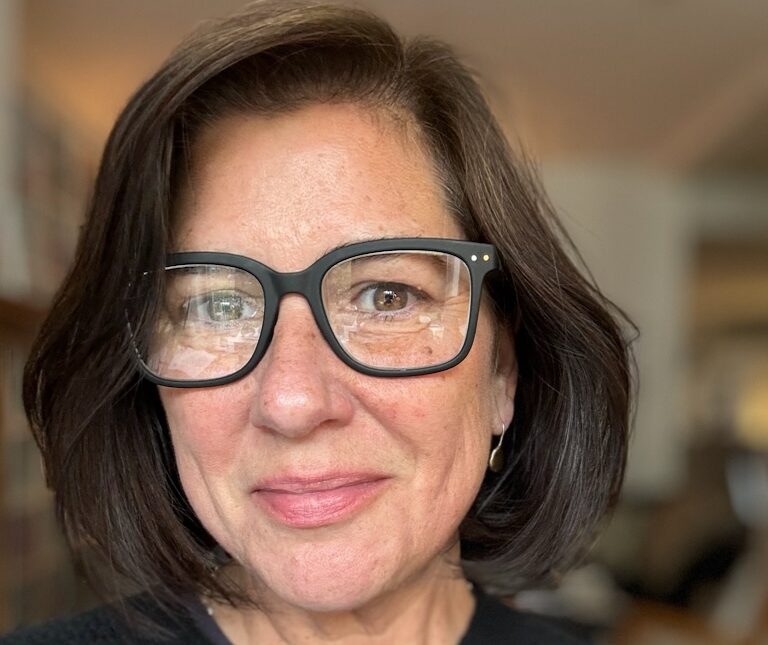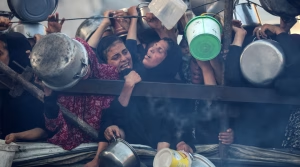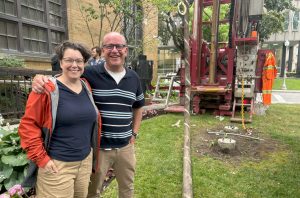Lisa Goldman reported on Israel-Palestine through the Second Intifada, the 2006 Lebanon War, and the Arab Spring. In 2010, she was part of the founding team of the independent reporting outlet +972 Magazine. She ended a decade-long reporting hiatus shortly before Oct. 7.
Today she is based in Montreal and works as a contributing editor at New Lines, where she has written on the wartime situation in Israel and Gaza.
Ben Wexler, a McGill University student, spoke with Goldman in mid-March at a café in Montreal’s Mile End for a sobering conversation on what has changed—and what remains the same in Israeli politics and reporting.
You went on a reporting trip to Israel and Palestine in the summer of 2023—only a few months before Oct. 7. Can you tell me a little about what you saw?
It was my first visit in 12 years, and the society had changed a great deal. Tel Aviv was always a bubble, but whereas before it was an Israeli bubble, today it’s an international bubble. A decade ago, you almost never heard English on the streets in Tel Aviv. Now it’s become very common, and that sounds minor, but it’s symbolic, because the rest of Israel is not at all like that. Despite the prosperity and the tech nomads in Tel Aviv, every single person I met told me that the place was about to explode.
I saw a city and a country on the edge—whether it was Palestinian schoolchildren being stopped on the way to school by Israeli police in Jerusalem, or my friends in Nablus terrified to let their children out of their sight because if a settler decides to kill him there would be no consequences.
And how do you think the war has changed the situation?
Well, there’s no going back. It’s only going get worse. There’s nobody to the left of (Israeli Prime Minister Benjamin) Netanyahu who could replace him in an upcoming election. The liberal left who believed in theory that a two-state solution was possible and desirable, no longer believes either one of those things.
I know people, Palestinian citizens of Israel, who are for the first time terrified for their physical safety. They say that Israeli leftists who they thought were allies and friends, people that they’d really been through a lot with, had shifted to the right and said that Hamas had proved that the real goal of Palestinians was to destroy Israel and kill as many Israelis as possible.
There are outbreaks of extreme violence in the West Bank that are probably going to trigger another organized uprising, which will be a slaughterhouse. So I think what we’re looking at right now in Israel and Palestine is bloodbath. I think the violence will spread.
You don’t see much viability to the anti-Netanyahu movement?
No. If you have soldiers off-duty, demonstrating for democracy and then going to Jenin to shoot people, then it’s not a viable movement. They’re saying they want democracy for themselves, not for others. It’s like an iteration of Animal Farm.
Do you think there is any possibility of Palestinians becoming visible in Israeli conversation or in the protest movement again?
The structures of the state are such that amplifying a Palestinian voice in the Israeli Jewish public discourse is basically seen as a traitorous act. The combination of deep fear and aggression felt towards Arabs in general and Palestinians specifically is not going anywhere. Oct. 7 has given permission to express racist opinions that were previously taboo amongst the intellectual Ashkenazi Tel Aviv elite.
Is there any constructive role in this for Canada or Canadians?
We don’t have a lot of diplomatic clout at the moment. But I think (Canadian Prime Minister Justin) Trudeau is in a very good position to say: we’re a country that’s post-national, we opened our arms to refugees from Ukraine, we opened our arms to refugees from Syria, we’re going to open our arms to refugees from Gaza.
You’ve been reporting on Israel-Palestine for many years now. In 2010, you were part of the founding team behind +972. What were the reasons for starting that magazine?
I started working on the ground as a reporter for Haaretz during the Second Intifada. And there was a powerful dissonance between the realities on the ground and what made it to the papers. I would be present, reporting on violent incidents in the West Bank, where I saw soldiers initiated extreme violence against unarmed Palestinian demonstrators. But the newspapers only quoted the army spokesperson who said that there had been riots. They never interviewed Palestinians, they never got proper verification, they reported what the army spokesperson said as straight news.
So I started blogging a lot. During the Second Lebanon War (2006), I was reporting on the war, and got a lot of interactions from international media outlets. That blogging overlapped with a handful of other Israeli reporters based in Tel Aviv. We decided to launch what was then an unfunded group blog, because we just felt it was incredibly important that there be a platform for lesser-known conversations, for Palestinian citizens of Israel. And now the editor-in-chief is a Palestinian citizen of Israel.
And how has reporting changed since 2010?
For decades in Israel, basically three families controlled Israeli media, along with the state broadcaster. But with economic development and social liberalization you’ve got a proliferation of outlets. You have a much more far-right discourse, but in tandem, an interesting phenomenon of a far-left discourse. It’s marginal, but they’re reaching far beyond what would be their target audience.
Right-wing media in Israel is very ascendant. Sheldon Adelson funded a paper called Israel HaYom. They used to call it the ‘Bibiton’—a portmanteau of Bibi (Netanyahu) and iton (newspaper). The editors were taking their orders strictly from the prime minister’s office for news reporting and analysis, but for culture it was very good. And it was free and you could even get it delivered to your home. Now there’s also Channel 14, a sort of Israeli Fox News.
Here is the weird thing about having an ascendant right wing, with social liberalization happening in tandem. There is mass racism, but you’ll have individual Arabs who will become very prominent and respected voices on Israel TV, which didn’t exist a decade ago, when things were supposedly more liberal. A few years ago, you almost never saw a news presenter who was religious. And now you see a lot of even haredim presenting news in the studio.
One thing that has not changed is that most Israelis, even educated polyglots, get almost all their news from domestic sources. They don’t trust foreign media to report their story empathetically or accurately. +972 Magazine is an English-language product. The readers are abroad, they’re not in Israel.
But then we launched Local Call, Sikha Mekomit, which is a sister publication for original Hebrew-language reporting. Some Israelis I met on my most recent visit – ordinary Israelis, who were not particularly political – told me that Local Call is their go-to when they want to find out what Palestinian citizens of Israel are saying.
We’ve spoken before about your wanting a Jewish intellectual culture less centered around Israel. Clearly there is now more of a focus than ever around Israel; more anxiety about the long-term security of Jewish communities in many places and you’re now back writing about Israel again. Do you think that there is any chance for a Diaspora less organized around the State of Israel?
That’s what I would want, but I don’t think it is likely. I think that Zionism and Israel, especially since 1967, have sucked the air out of the Jewish Diaspora intellectual discourse. People have been outsourcing their identity to Israel, which is a country they do not know, many have never visited, they do not speak Hebrew.
I am not downplaying the physical dangers in the Diaspora right now. We’ve seen schools shot at; we’ve seen bomb threats. But the Jewish community here is, in a very unhealthy way, embracing the real threat of physical violence as a means of drawing together. I think that Jews need to be a lot more realistic about what physical safety means and where it can be attained.
Israel is obviously the most dangerous place in the world for a Jew to live. Even when political Zionism emerged in the 1880s, safety was not a primary concern. The idea was a positive creativity—to create a homeland where intellectual and cultural endeavors for Jews would flourish. The concern now about Israel as a source of safety is a good example of the historical ignorance that has emerged, as a result of this vacuum created by the State of Israel.







